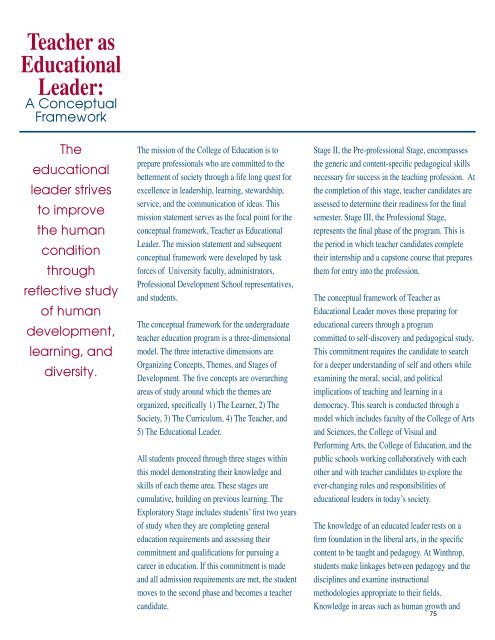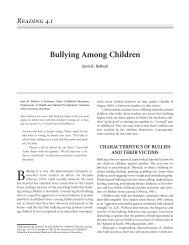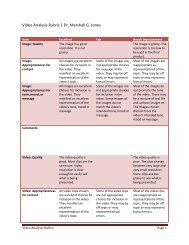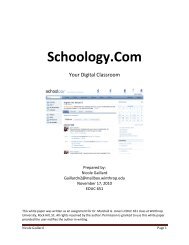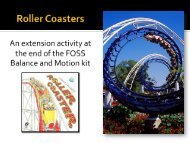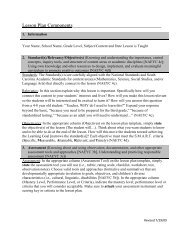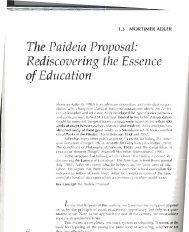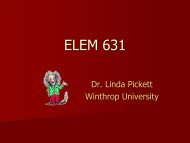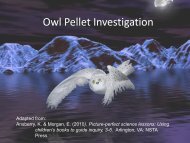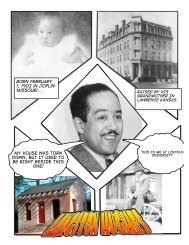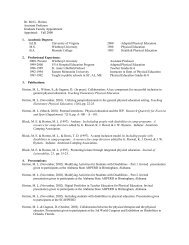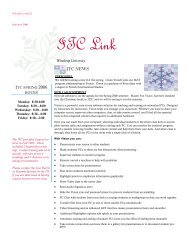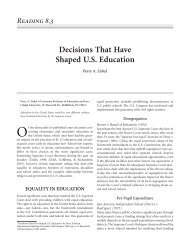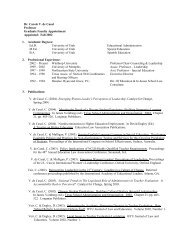2010-2011 Faculty Manual - College of Education - Winthrop ...
2010-2011 Faculty Manual - College of Education - Winthrop ...
2010-2011 Faculty Manual - College of Education - Winthrop ...
You also want an ePaper? Increase the reach of your titles
YUMPU automatically turns print PDFs into web optimized ePapers that Google loves.
Teacher as<br />
<strong>Education</strong>al<br />
Leader:<br />
A Conceptual<br />
Framework<br />
The<br />
educational<br />
leader strives<br />
to improve<br />
the human<br />
condition<br />
through<br />
reflective study<br />
<strong>of</strong> human<br />
development,<br />
learning, and<br />
diversity.<br />
The mission <strong>of</strong> the <strong>College</strong> <strong>of</strong> <strong>Education</strong> is to<br />
prepare pr<strong>of</strong>essionals who are committed to the<br />
betterment <strong>of</strong> society through a life long quest for<br />
excellence in leadership, learning, stewardship,<br />
service, and the communication <strong>of</strong> ideas. This<br />
mission statement serves as the focal point for the<br />
conceptual framework, Teacher as <strong>Education</strong>al<br />
Leader. The mission statement and subsequent<br />
conceptual framework were developed by task<br />
forces <strong>of</strong> University faculty, administrators,<br />
Pr<strong>of</strong>essional Development School representatives,<br />
and students.<br />
The conceptual framework for the undergraduate<br />
teacher education program is a three-dimensional<br />
model. The three interactive dimensions are<br />
Organizing Concepts, Themes, and Stages <strong>of</strong><br />
Development. The five concepts are overarching<br />
areas <strong>of</strong> study around which the themes are<br />
organized, specifically 1) The Learner, 2) The<br />
Society, 3) The Curriculum, 4) The Teacher, and<br />
5) The <strong>Education</strong>al Leader.<br />
All students proceed through three stages within<br />
this model demonstrating their knowledge and<br />
skills <strong>of</strong> each theme area. These stages are<br />
cumulative, building on previous learning. The<br />
Exploratory Stage includes students’ first two years<br />
<strong>of</strong> study when they are completing general<br />
education requirements and assessing their<br />
commitment and qualifications for pursuing a<br />
career in education. If this commitment is made<br />
and all admission requirements are met, the student<br />
moves to the second phase and becomes a teacher<br />
candidate.<br />
Stage II, the Pre-pr<strong>of</strong>essional Stage, encompasses<br />
the generic and content-specific pedagogical skills<br />
necessary for success in the teaching pr<strong>of</strong>ession. At<br />
the completion <strong>of</strong> this stage, teacher candidates are<br />
assessed to determine their readiness for the final<br />
semester. Stage III, the Pr<strong>of</strong>essional Stage,<br />
represents the final phase <strong>of</strong> the program. This is<br />
the period in which teacher candidates complete<br />
their internship and a capstone course that prepares<br />
them for entry into the pr<strong>of</strong>ession.<br />
The conceptual framework <strong>of</strong> Teacher as<br />
<strong>Education</strong>al Leader moves those preparing for<br />
educational careers through a program<br />
committed to self-discovery and pedagogical study.<br />
This commitment requires the candidate to search<br />
for a deeper understanding <strong>of</strong> self and others while<br />
examining the moral, social, and political<br />
implications <strong>of</strong> teaching and learning in a<br />
democracy. This search is conducted through a<br />
model which includes faculty <strong>of</strong> the <strong>College</strong> <strong>of</strong> Arts<br />
and Sciences, the <strong>College</strong> <strong>of</strong> Visual and<br />
Performing Arts, the <strong>College</strong> <strong>of</strong> <strong>Education</strong>, and the<br />
public schools working collaboratively with each<br />
other and with teacher candidates to explore the<br />
ever-changing roles and responsibilities <strong>of</strong><br />
educational leaders in today’s society.<br />
The knowledge <strong>of</strong> an educated leader rests on a<br />
firm foundation in the liberal arts, in the specific<br />
content to be taught and pedagogy. At <strong>Winthrop</strong>,<br />
students make linkages between pedagogy and the<br />
disciplines and examine instructional<br />
methodologies appropriate to their fields.<br />
Knowledge in areas such as human growth and<br />
75


